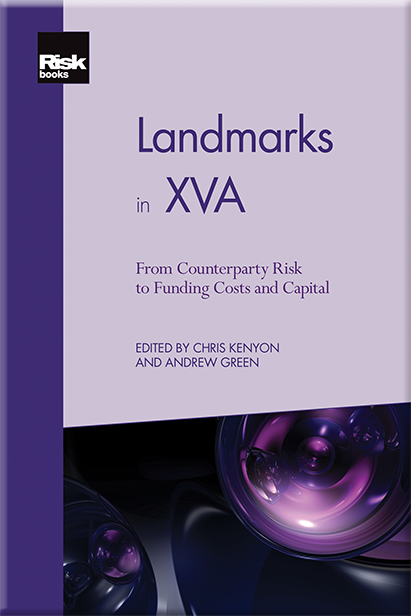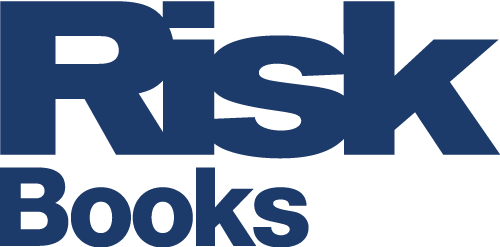Landmarks in XVA
Landmarks in XVA
Andrew Green and Chris Kenyon
Couldn't load pickup availability
The new challenges of FVA, DVA and CVA means that trading behaviour and the nature of trades need to be adapted to these valuation adjustments. Editors Chris Kenyon and Andrew Green gather together classic papers on these controversial pricing adjustments, from the seminal work by Hull and White on FVA to the latest developments with MVA and pricing, empowering you to become familiar with the evolving debate. These perennial pieces are placed beside newer work on regulation and accounting, providing access to the most traditional and the most cutting-edge work in this area in one volume.
Share

More information
About the Author
Andrew Green is the author of XVA: Credit, Funding and Capital Valuation Adjustments and has co-authored a number of papers on XVA. He has worked on XVAmodels for the last eleven years at a number of different banks. Andrew holds a BA and DPhil in physics from the University of Oxford and part III of the mathematics tripos from the University of Cambridge.
Chris Kenyon is the head of the XVAquantitative research group at Lloyds Banking Group. Previously, he was head quant for counterparty risk at Credit Suisse, and (post-crisis) head of structured credit valuation at DEPFA Bank Plc. He has published 11 papers in the “Cutting Edge” technical section of Risk magazine (on inflation, multi-curve pricing, credit, optimisation and XVA), has published in Quantitative Finance, Operations Research and IEEE Computer, and cowrote the book Discounting, Libor, CVA and Funding. He is a regular presenter at industry and academic conferences, including those of the Bachelier Finance Society and CREDIT. He has a PhD in applied mathematics from the University of Cambridge, and is a contributor to the open-source software Quantlib.
Table of contents
Introduction (Chris Kenyon and Andrew Green)
Section 1: Intuition
1. Being two-faced over counterparty credit risk (Jon Gregory)
2. Risky funding with counterparty and liquidity charges (Massimo Morini and Andrea Prampolini)
3. DVA for Assets (Chris Kenyon and Richard Kenyon)
4. Pricing CDSs’ capital relief (Chris Kenyon and Andrew Green)
Section 2: The FVA Debate
5. The FVA Debate (Jon Hull and Alan White)
6. The FVA Debate - Reloaded (Massimo Morini)
7. Regulatory costs break risk neutrality (Chris Kenyon and Andrew Green)
8. Risk-neutrality stays (Jon Hull and Alan White)
9. Regulatory costs remain (Chris Kenyon and Andrew Green)
Section 3: Theory: Collateralized Valuation - Discounting from OIS to CSA
10. Funding Beyond Discounting (Vladimir Piterbarg)
11. Cooking with Collateral (Vladimir Piterbarg)
12. Options for collateral options (Alexandre Antonov and Vladimir Piterbarg)
Section 4: Theory: Uncollateralized Valuation - CVA, FVA
13. Partial differential equation representations of derivatives with bilateral counterparty risk and funding costs (Christoph Burgard and Mats Kjaer)
14. In the Balance (Christoph Burgard and Mats Kjaer)
15. Funding strategies, funding costs (Christoph Burgard and Mats Kjaer)
16. The Funding Invariance Principle. (Youssef Elouerkhaoui)
17. Regulatory-Optimal Funding (Chris Kenyon; Andrew Green)
18. Close-Out Convention Tensions (Damiano Brigo; Massimo Morini)
19. Funding, Collateral and Hedging: Arbitrage-Free Pricing with Credit, Collateral and Funding Costs. (Andrea Pallavicini; Daniele Perini; Damiano Brigo)
20. Bilateral Counterparty Risk with Application to Credit Default Swaps (Damiano Brigo; Agostino Capponi)
Section 5: Theory: Beyond the CSA - KVA, MVA
21. KVA: Capital Valuation Adjustment by Replication (Andrew Green; Chris Kenyon, Chris Dennis)
22. From FVA to KVA: Including Cost of Capital in Derivatives Pricing (Youssef Elouerkhaoui)
23. Warehousing Credit Risk: Pricing, Capital and Tax (Chris Kenyon; Andrew Green)
24. MVA by Replication and Regression (Andrew Green; Chris Kenyon)
Section 6: Computation
25. Smoking Adjoints: Fast Evaluation of Monte Carlo Greeks (Michael Giles; Paul Glasserman)
26. Adjoint Greeks Made Easy (Luca Capriotti; Michael Giles)
27. BoundingWrong-Way Risk in Measuring Counterparty Risk (Paul Glasserman, Linan Yang)
28. Wrong-Way Risk the Right Way: Accounting for Joint Defaults in CVA (Dariusz Ga?tarek; Juliusz Jab?ecki)
29. Backward Induction for Future Values (Alexandre Antonov, Serguei Issakov, Serguei Mechkov)
30. A Non-Linear PDE for XVA by Forward Monte Carlo (Vladimir V. Piterbarg)
31. Efficient XVA Management: Pricing, Hedging and Allocation (Chris Kenyon; Andrew Green)
Section 7: Accounting
32. Accounting for KVA under IFRS 13 (Richard Kenyon; Chris Kenyon)
33. FVA Accounting, Risk Management and Collateral Trading (Claudio Albanese; Leif B. G. Andersen; Stefano Iabichino)
34. Derivatives Funding, Netting and Accounting (Christoph Burgard; Mats Kjaer)
Section 8
35. Managing XVA in the Ring-Fenced Bank (Robert Dargavel Smith)
36. XVA: A Banking Supervisory Perspective (David Lynch)
Annotated Bibliography
37. Annotated bibliography of XVA (Hringur Grettarson)

